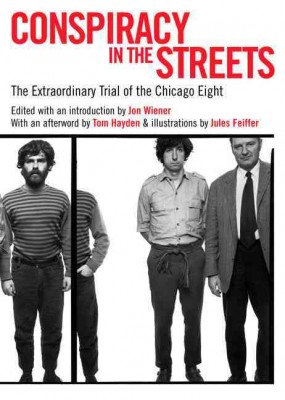| Conspiracy in the Streets: The Extraordinary Trial of the Chicago Seven Contributor(s): Wiener, Jon (Editor), Hayden, Tom (Afterword by), Feiffer, Jules (Illustrator) |
|
 |
ISBN: 1565848330 ISBN-13: 9781565848337 Publisher: New Press OUR PRICE: $16.19 Product Type: Paperback - Other Formats Published: August 2006 Annotation: On the stand with yippies, black panthers, and political activists at the conspiracy trial that defined the youth rebellion of the 1960s. ""Conspiracy? Hell, we couldn't agree on lunch.""--Abbie Hoffman Michael Moore mocks George Bush and Al Franken ridicules Rush Limbaugh, but the mixing of play and politics today is polite and respectful compared to the carnival of contempt known as the Chicago Eight trial. Opening at the end of 1969, the trial brought Yippies, antiwar activists, and Black Panthers to face conspiracy charges arising from the massive protests at the 1968 Democratic National Convention. The defendants openly lampooned the proceedings, with Abbie Hoffman blowing kisses to the jury and the defense bringing a Viet Cong flag into the courtroom. The judge ordered Bobby Seale of the Black Panthers bound and gagged for insisting on representing himself. And an array of celebrity witnesses appeared, including Timothy Leary, Norman Mailer, Arlo Guthrie, and Allen Ginsberg, who provoked the prosecution by chanting "Om" on the witness stand. This book combines an abridged transcript of the trial with astute commentary by historian Jon Wiener. A foreword by defendant Tom Hayden examines the trial's relevance for protest today, and drawings by legendary cartoonist Jules Feiffer help re-create the electrifying atmosphere of the courtroom. |
| Additional Information |
| BISAC Categories: - History | United States - State & Local - Middle Atlantic (dc, De, Md, Nj, Ny, Pa) - History | United States - 20th Century - Law | Legal History |
| Dewey: 345.773 |
| LCCN: 2005056185 |
| Physical Information: 0.7" H x 5" W x 8" (0.70 lbs) 283 pages |
| Themes: - Chronological Period - 1960's - Chronological Period - 1970's - Geographic Orientation - Illinois - Locality - Chicago, Illinois |
| Descriptions, Reviews, Etc. |
| Publisher Description: THE TRIAL THAT IS NOW A MAJOR MOTION PICTURE Reprinted to coincide with the release of the new Aaron Sorkin film, this book provides the political background of this infamous trial, narrating the utter craziness of the courtroom and revealing both the humorous antics and the serious politics involved Opening at the end of 1969--a politically charged year at the beginning of Nixon's presidency and at the height of the anti-war movement--the Trial of the Chicago Seven (which started out as the Chicago Eight) brought together Yippies, antiwar activists, and Black Panthers to face conspiracy charges following massive protests at the 1968 Democratic National Convention in Chicago, protests which continue to have remarkable contemporary resonance. The defendants--Rennie Davis, Dave Dellinger, John Froines, Tom Hayden, Abbie Hoffman, Jerry Rubin, Bobby Seale (the co-founder of the Black Panther Party who was ultimately removed from the trial, making it seven and not eight who were on trial), and Lee Weiner--openly lampooned the proceedings, blowing kisses to the jury, wearing their own judicial robes, and bringing a Viet Cong flag into the courtroom. Eventually the judge ordered Seale to be bound and gagged for insisting on representing himself. Adding to the theater in the courtroom an array of celebrity witnesses appeared, among them Timothy Leary, Norman Mailer, Arlo Guthrie, Judy Collins, and Allen Ginsberg (who provoked the prosecution by chanting Om on the witness stand). This book combines an abridged transcript of the trial with astute commentary by historian and journalist Jon Wiener, and brings to vivid life an extraordinary event which, like Woodstock, came to epitomize the late 1960s and the cause for free speech and the right to protest--causes that are very much alive a half century later. As Wiener writes, At the end of the sixties, it seemed that all the conflicts in America were distilled and then acted out in the courtroom of the Chicago Conspiracy trial. An afterword by the late Tom Hayden examines the trial's ongoing relevance, and drawings by Jules Feiffer help recreate the electrifying atmosphere of the courtroom. |